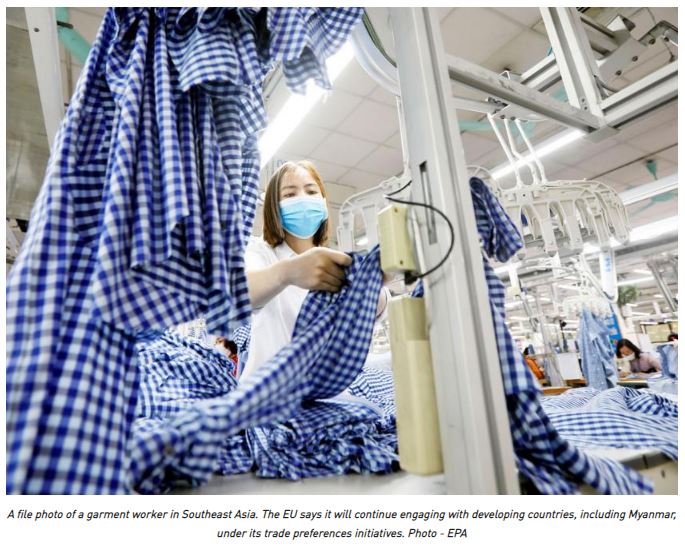‘EU to continue engaging with Myanmar under EBA trade-preference initiative’
The European Union (EU) says it will continue to engage with countries, including Myanmar, that fall under its Everything But Arms (EBA) trade initiative.
EBA is an initiative under which all imports to the EU from the Least Developed Countries are duty-free and quota-free, with the exception of armaments. The initiative is part of the EU Generalised System of Preferences (GSP) aimed at encouraging development of the world’s poorest countries.
Separately, the EU released a report titled “EU Enhanced Engagement with three Everything But Arms beneficiary countries: Bangladesh, Cambodia and Myanmar”. The report, for the period 2016 to 2017, covered the EU’s engagement with the beneficiary countries.
According to the report, the EU said that the enhanced engagement with Myanmar focused more broadly on compliance with human rights conventions, and labour rights.
The report said that the international community became seriously concerned about gross human rights violations and abuses amounting to crimes against humanity, particularly in Rakhine, Kachin and Shan states. This was also described in the final report of the Advisory Commission on Rakhine State (Annan Report), the various reports of UN Independent International Fact-Finding Mission (IIFFM), the Special Rapporteur on the situation of Human Rights in Myanmar, the Office of the High Commissioner for Human Rights, and the reports of the International Labour Organization supervisory mechanism.
These concerns, also expressed by the EU, are notably with regard to full accountability of those who have committed serious atrocities and violations of human rights that took place in Rakhine State and elsewhere in the country. The EU has also requested full humanitarian access not only to Rakhine State, but also to Kachin and Shan states; and the establishment of conditions conducive to the safe, dignified, sustainable, and voluntary return of refugees from Bangladesh and internally displaced persons (IDPs), in particular by fully implementing the recommendations made by the Advisory Commission on Rakhine State.
Key EU concerns regarding the situation in Myanmar relate to the non-implementation of the principles of several international human rights conventions listed in the GSP Regulation, namely: the Convention on the Prevention and Punishment of the Crime of Genocide, the International Covenant for Civil and Political Rights (ICCPR), International Covenant on Economic, Social and Cultural Rights (CESCR), Convention on the Rights of the Child (CRC), the Conventions on Elimination of Racial Discrimination (CERD), Convention of the Elimination of Discrimination against Women (CEDAW), Convention against Torture (CAT); and fundamental labour (ILO) principles.
However, the report states that Myanmar has shown a constructive attitude and engagement on the issues of concern raised by the EU. There are some positive signs but progress on more complex issues remains difficult. Serious human rights violations in conflict areas are reported to continue. Further challenges are due to the continued conflicts in Rakhine State with the Arakan Army and renewed fighting in northern Shan State between various non-state actors and the Tatmadaw (military).
The EU will continue its active engagement with the government of Myanmar including within the EBA enhanced engagement and in multilateral forums such as UN Human Rights Council, UN General Assembly, and ILO and will possibly consider additional targeted restrictive measures in order to promote progress in all areas of concern. Progress, among others, is expected in the following areas: legislation on freedom of expression, combating hate speech, humanitarian access, conditions for IDPs, implementation of the recommendations of the Report of the Advisory Commission on Rakhine State, accountability for human rights violations and cooperating with all UN-mandated bodies, eliminating hazardous child labour, addressing child and forced labour, providing a timeline on amending section 359 of the 2008 Constitution, which exempts from the prohibition of forced labour, ensuring freedom of association and collective bargaining.
Asked for his comments on the report, EU Ambassador to Myanmar Mr Kristian Schmidt said in an emailed response to The Myanmar Times: “Around the world, the EU’s trade is a crucial tool to improve human rights, labour rights and good governance. Through the EU’s Generalised Scheme of Preferences, we help developing countries grow in a sustainable manner. Also in Myanmar, our [EBA] preferential trade tariffs have helped to lift thousands out of poverty and reduce inequalities. Since 2015, Myanmar’s exports to the EU have grown by over 230 percent.
“The EU imports twice as much from least developed countries like Myanmar as the rest of the world does. Today’s report shows that, partly thanks to GSP, countries like Myanmar are making constructive efforts to improve on labour rights, child rights and adherence to universal values. As could be expected, however, the report also points to a number of areas where the EU will continue to encourage Myanmar to make urgent efforts, and we will continue our enhanced monitoring on issues such as democratic reforms, freedom of expression, cooperation with the UN and the rights of the Rohingya.”
“For Bangladesh, and Myanmar, the European Commission will review the situation and decide on the next steps. If dialogue fails to produce sufficient results, the EU remains ready, as a last resort, to launch the procedure for withdrawal of preferences with due consideration for the economic and social impact of such a withdrawal. For Myanmar, discussions on restrictive measures will continue concurrently with the EU Member States to review the list of targeted individuals and to explore possibilities for expanding the scope to include economic entities,” Schmidt added.
Myanmar’s main exports to the EU under the EBA are apparel and clothing. Myanmar increased its exports to the EU 10-fold since it was granted EBA preferences in 2013.
Source: https://www.mmtimes.com/news/eu-continue-engaging-myanmar-under-eba-trade-preference-initiative.html


 Thailand
Thailand




